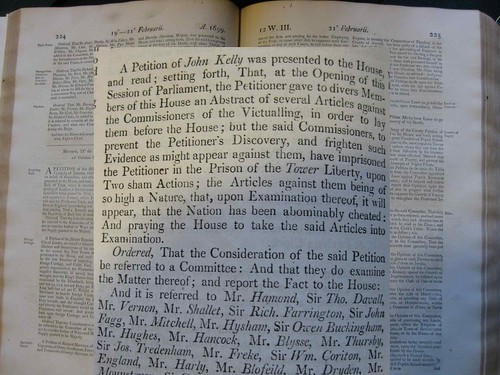There have been discussions about whether there is a domestic precedent whereby the right to talk to MPs about issues of public interest is protected by parliament. This already happens in Australia.
The following case from the parliamentary journals in 1699 is exactly that. John Kelly provided information about malpractise to a number of MPs. That was not provided as part of a petition, but merely as a summary of a problem. He was then jailed. Parliament investigated the situation.
That is the stage I have reached with my request for parliament to investigate hyperinjunctions.
There are other examples from the 1600s and 1700s on my flickr account and a summary follows the image.

Parliamentary Privilege has been primarily applied to protect members. That is because most actions which would be in contempt of parliament will directly affect members. There are, however, a number of instances where non-members have been protected by parliamentary privilege.
The use of privilege to protect witnesses at Committees is well known. However, there have also been a number of cases where parliamentary privilege has been used to protect non-members who are providing information to Parliamentarians. Documentary evidence from the parliamentary journals is attached.
In 1624 the Master of the Felt-makers was arrested whilst attending The House to prefer a petition. The House considered he had protection of the house to prefer the petition and established a committee to consider whether the arrest itself was a breach of privilege. (I 766)
In 1696 Thomas Kemp and other Hackney Coachmen were arrested as a consequence of proceedings by Richard Gee, a Commissioner of Hackney Coaches. The House concluded that Mr Gee was guilty of a breach of Privilege and guilty of a high misdemeanor and was to be imprisoned by the Serjeant. (XI 599, 699)
In 1699 John Kelly was imprisoned in consequence of having given Members and abstract of several articles against the Commissioners of Victualling. That was referred to the privileges committee (XIII 224)
There have also been many actions to protect letters written to Members and from Members from being opened or diverted. In 1666 Edward Roberts was imprisoned for trying to charge for letters. In 1689 a case was referred relating to Hull. In 1689 it was resolved that “breaking open Letters directed to or sent from Members is a breach of Privilege;”
What is important about this is that it demonstrates that private communication between citizens (or subjects) and members of parliament does have a limited privilege. Any attempts to prevent this communication are, therefore, a Contempt of Parliament.
The following case from the parliamentary journals in 1699 is exactly that. John Kelly provided information about malpractise to a number of MPs. That was not provided as part of a petition, but merely as a summary of a problem. He was then jailed. Parliament investigated the situation.
That is the stage I have reached with my request for parliament to investigate hyperinjunctions.
There are other examples from the 1600s and 1700s on my flickr account and a summary follows the image.

Parliamentary Privilege has been primarily applied to protect members. That is because most actions which would be in contempt of parliament will directly affect members. There are, however, a number of instances where non-members have been protected by parliamentary privilege.
The use of privilege to protect witnesses at Committees is well known. However, there have also been a number of cases where parliamentary privilege has been used to protect non-members who are providing information to Parliamentarians. Documentary evidence from the parliamentary journals is attached.
In 1624 the Master of the Felt-makers was arrested whilst attending The House to prefer a petition. The House considered he had protection of the house to prefer the petition and established a committee to consider whether the arrest itself was a breach of privilege. (I 766)
In 1696 Thomas Kemp and other Hackney Coachmen were arrested as a consequence of proceedings by Richard Gee, a Commissioner of Hackney Coaches. The House concluded that Mr Gee was guilty of a breach of Privilege and guilty of a high misdemeanor and was to be imprisoned by the Serjeant. (XI 599, 699)
In 1699 John Kelly was imprisoned in consequence of having given Members and abstract of several articles against the Commissioners of Victualling. That was referred to the privileges committee (XIII 224)
There have also been many actions to protect letters written to Members and from Members from being opened or diverted. In 1666 Edward Roberts was imprisoned for trying to charge for letters. In 1689 a case was referred relating to Hull. In 1689 it was resolved that “breaking open Letters directed to or sent from Members is a breach of Privilege;”
What is important about this is that it demonstrates that private communication between citizens (or subjects) and members of parliament does have a limited privilege. Any attempts to prevent this communication are, therefore, a Contempt of Parliament.
Comments